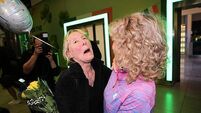Billy Burns' psychiatrists differ over insanity verdict in matricide case

Eoin Reynolds
Dr Eugene Morgan, who was called by defence lawyers for Billy Burns (55), confirmed under cross-examination that he never asked the accused about the killing of his mother.
Mr Burns accepts killing but denies murdering his mother, Miriam Burns (75), at her home in Ardshanavooley, Killarney, Co Kerry, between August 12th and August 15th, 2022.
Ms Burns died from manual strangulation associated with blunt force trauma to the head.
Mr Burns has pleaded not guilty to her murder by reason of insanity and is on trial at the Central Criminal Court.
On Friday, Dr Morgan told defence barrister Anthony Sammon SC that he is a consultant psychiatrist with 50 years of experience.
He saw the accused man eleven days after the alleged offence, when Mr Burns was on remand in Cork Prison. Dr Morgan found Mr Burns to be hypomanic and his condition deteriorated to mania over the following days.
Dr Morgan agreed with a diagnosis that Mr Burns had bipolar affective disorder.
In December of that year, the prison transferred Mr Burns to the Central Mental Hospital where he was given a weekly injection of antipsychotic medication at a high therapeutic dose, the doctor said.
On January 24th, the following year, he returned to Cork Prison and his mental state was much improved, Dr Morgan said.
He described the accused as a "gentleman" who was helpful and courteous, whereas he had been incoherent and aggressive prior to treatment.
Dr Morgan said he considered the accused's presentation when he saw him at Cork Prison, garda transcripts of interviews following his arrest three or four days after the alleged murder and the accused man's own accounts.
Dr Morgan said he was satisfied the accused was suffering from a relapse of bipolar affective disorder secondary to poor compliance with medication and illicit substance misuse when he assaulted his mother.
Dr Morgan said he was further satisfied that due to his mental illness, Mr Burns did not know the nature and quality of his actions, was unable to determine whether his actions were wrong and was likely unable to refrain from his actions.
He said Mr Burns meets the criteria under the Criminal Law (Insanity) Act 2006 for a special verdict of not guilty by reason of insanity.
Under cross-examination Dr Morgan agreed with Sean Guerin SC, for the Director of Public Prosecutions, that he had been Mr Burns's treating psychiatrist at Cork prison.
Mr Guerin put it to him that it is generally good practice that a treating psychiatrist not give opinions in court about their patient.
Dr Morgan said there was "some merit in that idea" but due to a shortage of psychiatrists outside Dublin, "one has to provide reports on cases where required". As a professional psychiatrist, he said he is required to be impartial and to offer a non-biased opinion.
Dr Morgan confirmed that he never asked the accused about the alleged killing of his mother. He said he would not ask about the alleged offence because he would not want to be "put in a situation of having information you might have to divulge in court".
Dr Morgan said he could not offer "certainty" about the accused's mental state at the time of the killing, because he wasn't there.
However, he said he based his findings on how the accused appeared eleven days after the killing and from reading transcripts of the interviews he gave to gardai following his arrest three to four days after the killing.
He accepted that he did not look at videos of Mr Burns's garda interviews.
Dr Morgan said the accused man told him that in the lead-up to the alleged offence, he was drinking ten beers per day with "whiskey chasers" and taking crack cocaine, cannabis and ecstasy.
Dr Morgan said he would have to consider that drug and alcohol use contributed to Mr Burns's behaviour but the "major factor" was his illness. Dr Morgan accepted that drug and alcohol use "may have been the cause of the relapse in his mental state".
Book of evidence
Dr Stephen Monks told Mr Guerin that in his report, he referred to statements in the book of evidence, Mr Burns's history of psychiatric treatment going tack to 1991 and videos of his interviews with gardai and his own interviews with the accused.
Dr Monks said the accused told him that in the week before his mother's death, he had been bingeing on alcohol and smoking cannabis and crack cocaine.
His drug use, Dr Monks said, likely caused a relapse or worsened the symptoms of bipolar disorder. It is also likely that Mr Burns was not just manic at the time of the killing, but also intoxicated the witness said.
Dr Monks said the accused man told him he was hearing voices in his head telling him to kill his mother. The doctor said there was no record in Mr Burns's previous history of auditory hallucination and he had not told anyone else about hearing voices.
Dr Monks said this put limitations on the weight he could give to the account of hearing voices.
On balance, Dr Monks found that Mr Burns was more likely not psychotic at the time he killed his mother although he was suffering mania or hypomania with intoxication.
Notwithstanding his manic symptoms, he understood the nature and quality of his actions and knew that it was wrong to assault his mother, Dr Monks said.
In his garda interviews, Mr Burns clearly understood that he was being questioned about killing his mother and denied killing her, he said.
The mania Mr Burns was suffering would have lowered his threshold for impulsive aggression, Dr Monks said. However, mania would not be sufficient to remove his ability to refrain from killing his mother.
Dr Monks also found that mental illness did not explain Mr Burns's previous acts of aggression towards his mother over many years, that were detailed in the book of evidence and in his psychiatric history.
Dr Monks concluded that in his opinion, the presence of mania does not support a special verdict of not guilty by reason of insanity.
Dr Monks will be cross-examined by defence counsel on Monday before Ms Justice Karen O'Connor and a jury of eight men and four women.




